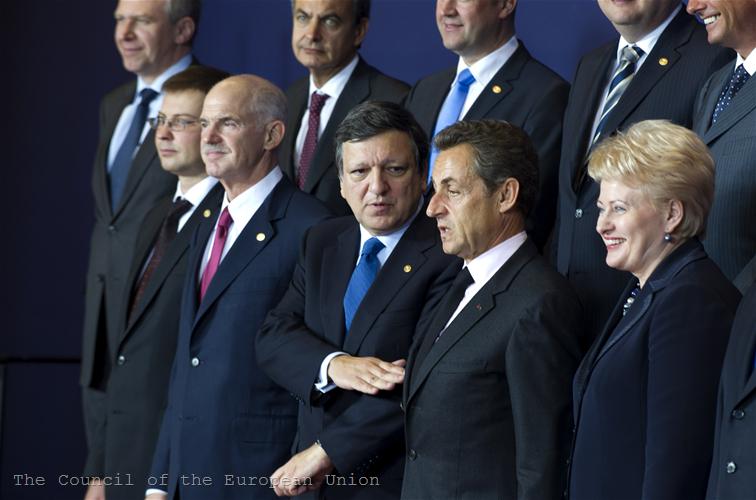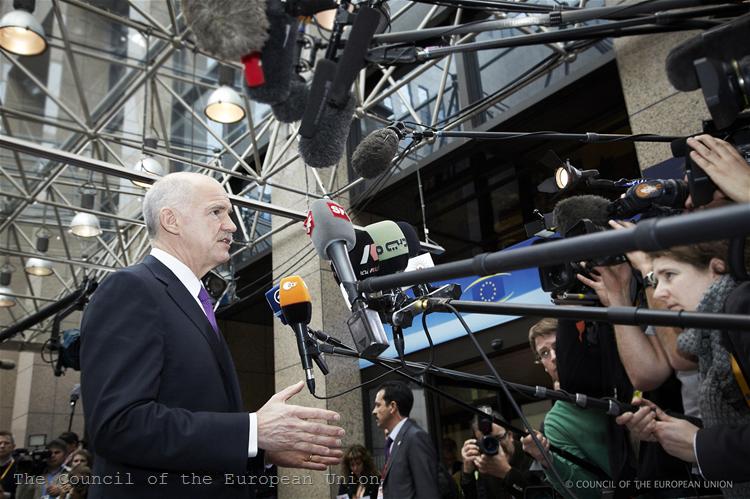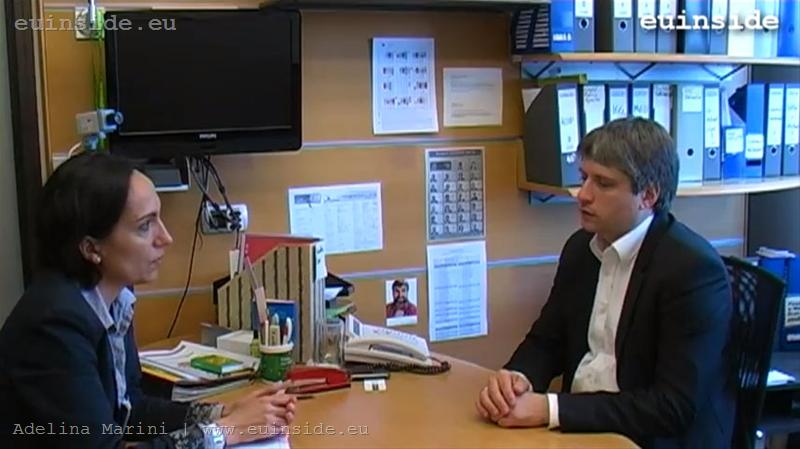Number 28? Let him come in
Adelina Marini, June 29, 2011
 Many are the reasons why the European Union has decided to accelerate Croatia's accession process. For example, because indeed Croatia demonstrates something more than a "momentum for reforms" and "political will" (as is the case of Bulgaria) to tackle corruption and organised crime. Or because, against the backdrop of the deepening crisis in the euro area, the feeling that the EU is falling apart should not be allowed to get stronger, on the contrary - it is being enlarged with every country that fulfills the criteria not in words but by actions. And also because the Western Balkans were for a while off European Union's agenda and there still are a lot of unhealed wounds. Most probably there is something of all the above in it. Which is why the responsibility for Croatia is huge.
Many are the reasons why the European Union has decided to accelerate Croatia's accession process. For example, because indeed Croatia demonstrates something more than a "momentum for reforms" and "political will" (as is the case of Bulgaria) to tackle corruption and organised crime. Or because, against the backdrop of the deepening crisis in the euro area, the feeling that the EU is falling apart should not be allowed to get stronger, on the contrary - it is being enlarged with every country that fulfills the criteria not in words but by actions. And also because the Western Balkans were for a while off European Union's agenda and there still are a lot of unhealed wounds. Most probably there is something of all the above in it. Which is why the responsibility for Croatia is huge.
The 28th member of the EU
The leaders of the EU welcomed on Friday, during the June European Council, the efforts of Croatia that allowed the swift completion of the accession negotiations. In their conclusions, the leaders have written that these developments will bring a new momentum for the European perspective of the Western Balkans, but only if these countries continue on the path of reforms. The European Council will return to this matter again at its December meeting, the document says. After the end of the  Council, European Commission President Jose Manuel Barroso also emphasized that all Balkan countries should view Croatia as a very strong signal to continue their European perspective.
Council, European Commission President Jose Manuel Barroso also emphasized that all Balkan countries should view Croatia as a very strong signal to continue their European perspective.
Moreover, he said that Croatia could join on 1st of July 2013 and even said that he was anticipating a commissioner from Croatia.
All this is happening in a very tense moment for the Croatian Government, headed by Prime Minister Jadranka Kosor. Unfortunately, during the short news conference after the Council of Ms Kosor, Mr Barroso and Mr Van Rompuy there was no opportunity for many questions, which is why the issue of how this news would reflect on the internal political events remained unanswered, although according to local media and analysts this would in no way safe Kosor's government. And obviously this was not the goal, as it becomes clear from the words of the Croatian Premier, who behaved like a true European politician and said:
"This indeed is a historic moment for Croatia, for all citizens. All this is happening on the eve of the 20th anniversary of Croatia's independence. We will continue to work vigorously not only until the accession, but afterwards too. We are energised by this moment, it is a huge boost for us. All efforts were worth it", Ms Kosor added by committing Zagreb to assist its neighbouring countries on their way to European integration, because "we agree that this is the only solution for a long-term peace and prosperity in South East Europe".
This statement shows that some countries in the region are mature to overcome the centuries long hostilities in the Balkans, which did not prevent a lot of colleagues in the EU to ask, nonetheless, why the haste. During German Chancellor Angela Merkel's national briefing, after the Council on Friday afternoon, a German colleague asked precisely this question, after Ms Merkel mentioned in her introduction that EU leaders noted "with pleasure" that the negotiations could be concluded. In her words, it is true that in March, in the European Commission's report, a lot of shortcomings were pointed out, particularly in the area of the judiciary and home affairs, but Croatia has removed a large part of the barriers, "so there is no need for us to drag our feet".
Without a monitoring mechanism
 One of the issues that accompanied Croatia's accession process was whether the country would wake up with the same monitoring mechanism like the one imposed on Bulgaria and Romania with their accession and which is still active five years later. In the Council's conclusions it is written: "Croatia should continue its reform efforts with the same vigour, in particular as regards the judiciary and fundamental rights, so as to be able to assume fully the obligations of membership from the date of accession. Monitoring up to accession of these reform efforts will give the necessary assurance to Croatia and current Member States. The Council, acting by qualified majority on a proposal from the Commission, may take all appropriate measures".
One of the issues that accompanied Croatia's accession process was whether the country would wake up with the same monitoring mechanism like the one imposed on Bulgaria and Romania with their accession and which is still active five years later. In the Council's conclusions it is written: "Croatia should continue its reform efforts with the same vigour, in particular as regards the judiciary and fundamental rights, so as to be able to assume fully the obligations of membership from the date of accession. Monitoring up to accession of these reform efforts will give the necessary assurance to Croatia and current Member States. The Council, acting by qualified majority on a proposal from the Commission, may take all appropriate measures".
It was the last sentence that forced Croatian journalists to ask whether this  meant some form of a safeguard mechanism. In response European Council President Herman Van Rompuy explained that the same sentences were used in the reports of the Commission after the closure of chapters. "There are no new conditions. I am fully convinced that on the chapter of judiciary Croatia will fulfill all the remarks", he concluded.
meant some form of a safeguard mechanism. In response European Council President Herman Van Rompuy explained that the same sentences were used in the reports of the Commission after the closure of chapters. "There are no new conditions. I am fully convinced that on the chapter of judiciary Croatia will fulfill all the remarks", he concluded.
A closer look at the text actually shows that the Council is invited with a qualified majority to approve the Commission's proposal Croatia to become the 28th member of the EU as of July 1st 2013. euinside also tried to learn whether, after all, the issue of some form of a mechanism was discussed and asked the Bulgarian Prime Minister, Boyko Borissov. He, however, was unable to understand the question and constantly recalled what was agreed on Schengen, which is the biggest failure of his government so far. A failure that would hardly be left unnoticed, especially against the backdrop of Croatia's achievements. After all Croatia went through hard times in the last 20 years - gaining its independence (after going through a brief war), building a state, economy and reconciliation with he past - things which Bulgaria, in spite of the fact that it has been a member of the EU for 5 years and never had to fight for its independence, has not achieved yet.
 Maybe this is why the statement of the spokesperson of the Ministry for Foreign Affairs on the occasion of the Commission's proposal for Croatia was so neutral. It is pointed out in it that Bulgaria welcomes the decision of the European Commission to recommend completion of Croatia's accession negotiations - a step towards the country's accession to the European family. "This success is a proof that the systemic efforts for reforms and the implementation of membership criteria pay back. Croatia turned into a positive example for all the other countries in the Western Balkans. We are convinced that Croatia, as a member of the EU, will be an even stronger stabilising factor in the region. The policy of enlargement is the strongest tool for the stabilisation and prosperity of our region", the statement reads.
Maybe this is why the statement of the spokesperson of the Ministry for Foreign Affairs on the occasion of the Commission's proposal for Croatia was so neutral. It is pointed out in it that Bulgaria welcomes the decision of the European Commission to recommend completion of Croatia's accession negotiations - a step towards the country's accession to the European family. "This success is a proof that the systemic efforts for reforms and the implementation of membership criteria pay back. Croatia turned into a positive example for all the other countries in the Western Balkans. We are convinced that Croatia, as a member of the EU, will be an even stronger stabilising factor in the region. The policy of enlargement is the strongest tool for the stabilisation and prosperity of our region", the statement reads.
Beyond joy and congratulations, indeed a huge responsibility lies on the shoulders of the small Balkans country, because its accession will happen in a moment of a severe crisis for the European Union and the eurozone in particular. A moment, in which the EU cannot afford more mistakes like the one with Greece or the one with Bulgaria and Romania. No one can become a member of the EU unless well prepared, because this erodes the very foundations of the Union and if it falls apart - everyone will suffer, but some will suffer more.
 | © The Council of the European Union
| © The Council of the European Union | © The Council of the European Union
| © The Council of the European Union Bakir Izetbegovic, Andrej Plenkovic | © Council of the EU
Bakir Izetbegovic, Andrej Plenkovic | © Council of the EU Aleksandar Vucic, Recep Tayyip Erdogan | © Serbian Presidency
Aleksandar Vucic, Recep Tayyip Erdogan | © Serbian Presidency Jean-Claude Juncker, Zoran Zaev | © European Commission
Jean-Claude Juncker, Zoran Zaev | © European Commission | © euinside
| © euinside